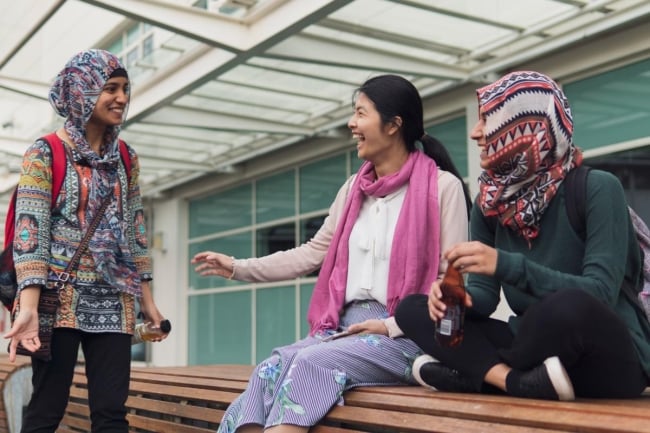You have /5 articles left.
Sign up for a free account or log in.

The more college students are exposed to diverse viewpoints and backgrounds, the better they perceive different perspectives over all, a new study found.
Istockphoto.com/kaz_c
At a time when many people are trying to figure out how to increase tolerance on college campuses (and elsewhere), the authors of a new study believe they have part of an answer: encourage students to make friends with people with worldviews different from their own.
The study done by the Interfaith Youth Core found that relationships between students from differing faiths and political views encourage them to be more empathetic and understanding of others’ beliefs. This study was a part of the organization's Interfaith Diversity Experiences and Attitudes Longitudinal Survey (IDEALS), which focuses on undergraduate students' interactions with others of diverse worldviews and religions. The more friends students have across worldviews, the more likely they are to grow in their appreciations of those religious groups and different identity groups in general.
“Something that has really started to emerge from our findings is the role of close friendships in helping students to have more positive attitudes toward others of different walks of life,” said Alyssa Rockenbach, professor of higher education at North Carolina State University and co-principal investigator on the survey. “The goal of this report was really to help us hone in on what those experiences are like for students and also the impact those friendships have.”
“It becomes really important when you think about how colleges are recruiting international students, because a lot of international students come with different faith-based traditions,” said Matthew Mayhew, professor of educational administration at Ohio State University and the other co-principal investigator on the study.
“They leave and graduate from American universities and go back to serve as leaders in their home nations, so we have this four-year opportunity to really curate how students work with each other to build solutions and how they work across these narrative differences,” said Mayhew.
The survey also found that students who made five or more interworldview friendships during their first few weeks of college were most likely to end their first year with more interworldview friendships.
“We were pleased to see that students are either maintaining the close friendships that they have across worldviews through that year, or they are gaining more friends,” said Rockenbach. She says this gives students more pluralistic mind-sets, which makes them well prepared to graduate college and contribute to their workplaces in more productive ways.
The study showed that students who gain a friend with a particular worldview view more positively not only members of that demographic, but people with other worldviews as well. These effects seem to generalize through people’s social networks.
One of the more interesting findings in the current political and social climate is that students reported they were able to maintain friendships with those they disagreed with politically. In fact, on the spectrum of self-reported political ideologies, those that listed themselves as more to the left or right were more likely than those in the middle of the ideology spectrum to be able to maintain friendships with people they had disagreed with politically.
“Students are showing that they have friendship tenacity,” Rockenbach said. “Even in the midst of conflict, students are able to work through those and maintain relationships.”
“I can’t emphasize enough how important it is that we are finally explaining peer effects,” Mayhew said. “Friendships are what drive these outcomes. It’s not just these loose, nebulous peer effects that we’ve talked about for 40 years.”
Institutions Can Play Key Role
The authors remind college leaders that friendships can't be socially engineered, and that as they craft programs, they should think about what they’re doing to nurture and create these relationships that go beyond just contact and conversations. A lot of this has to do with access.
Having meals together and sharing informal social times is a way for students to come together and should be encouraged. Beyond that, there are physical ways institutions can create greater access to diverse relationship building.
“It may be something as straightforward as having offices for different religious or worldview groups located near one another, and informal spaces around those offices where students of different backgrounds can congregate and get to know another well,” Rockenbach said.
Rockenbach said that institutions should create expectations around students becoming friends with others of different worldviews and raise awareness of the patterns students fall into with the friendships they develop.
For other formal interfaith engagement initiatives, Rockenbach recommends introducing practices in first-year orientations.
When it comes to multicultural centers and spaces, Rockenbach cautions that educators should ensure that conversations are productive and that students approach them with open-mindedness to have dialogues in a productive way. Missteps in peer relationships can easily happen when discussing difficult issues if students lack these skill sets.
Students from over 120 universities, all different types, were followed over the course of a year. Around 20,000 students were surveyed at the beginning, and just over 7,200 of those students responded to the end poll.




